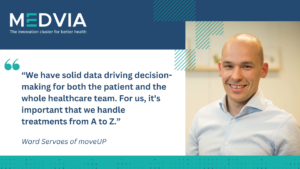MoveUP is unlocking the potential of digital therapies with apps that can be used to support a patient’s care journey from A to Z. The company has developed solutions for a range of indications, including orthopedic and bariatric surgery, facilitating the exchange between patients and a whole team of healthcare practitioners in both pre- and post-operative care.
13 February 2024
MoveUP is a Belgian company with an apt origin story: It started over a couple of beers. At a business school nearly 20 years ago, Ward Servaes (a software engineer) sat down for a cold brew with Charles-Eric Winandy (a data engineer) and Philippe Van Overschelde (an orthopedic surgeon).
“Philippe was telling us that surgeons like him had a problem,” says Ward. “After knee and hip replacements, the length between consultations led to periods with no patient contact – blind spots where patients often waited too long to notify them if a problem arose. This in turn led to suboptimal results, sometimes even revision of the implant, when issues like swelling or inflammation weren’t reported in time.”
Being engineers, Ward and Charles-Eric put their heads together to tackle the problem. What they came up with a digital health solution: a smartphone app, connected to wearables, that could be used to coordinate pre- and post-operative care between multiple healthcare professionals and the patient to improve both reporting and rehabilitation.
A one-stop shop
MoveUP has since collaborated with a range of healthcare providers, biotechs and pharmaceutical companies to create a series of digital care applications. The company has worked in a huge range of areas, including orthopedics, neurology, oncology, cardiology and respiratory conditions.
One of the apps is for bariatric surgery, an obesity treatment with a very multidisciplinary approach. “Each patient will be seen by a doctor, bariatric surgeon, endocrinologist, dietician, physiotherapist and psychologist,” says Ward. “In Belgium, the criteria for undergoing this procedure are very strict, and the specialists will jointly decide whether the patient is eligible for the surgery.”
The moveUP app collects the patient’s information in one place (such as weight, diet and activity level), accessible to healthcare providers via an intuitive dashboard. Then, if the surgery goes ahead, the app can also be used by both practitioners and the patient in the post-operative phase.
“The app improves the patient experience because they can access all the information from these different specialists in one place,” Ward explains. “Instead of receiving a pile of brochures and papers in separate consultations, they have a single app where they can easily keep track of their recommended exercises and diet, etc.”
The patient can also use the in-app chat to alert the doctor if something has gone wrong, while the members of the healthcare team can monitor, coach and adapt the treatment of the patient through the interface. MoveUP has even set up automatic alerts: If the patient is reporting low self-esteem, for example, the company will send a notification to the psychologist on standby so that they know to check in with the patient.
According to Ward, this holistic strategy is what sets moveUP apart from other patient monitoring apps. “We have solid data driving decision-making for both the patient and the whole healthcare team. For us, it’s important that we handle treatments from A to Z; instead of facilitating a couple of days of monitoring, we make sure that each patient’s care journey can be managed as a whole, with real-time reports and interactions.”
Patient peace of mind
MoveUP brings different care providers into one system, capturing patient-reported outcome measures (PROMs) through clinically validated questionnaires and the patient chat. Through connected wearables, performance-based outcome measures (PBOMs) – like activity levels, sleep and gait – are also collected and analyzed.
“It gives healthcare provides a better handle on patient recovery, while also lending the patients a greater sense of support and reassurance,” Ward states. “They know they can use the chat if they have questions or if something goes wrong. It’s a real win-win scenario for everyone.”
MoveUP is also developing and launching data-driven functionalities and partnerships based on the secondary use of health data. Using historical data and expert input, moveUP Index can predict the outcome of certain interventions, like a knee surgery, or identify patients who needing extra support early on. Examples like these help the specialist and care team to improve patient outcomes, but also improve their planning and organization of their practices.
Blazing a trail in Belgium
MoveUP is one of Belgium’s pioneering companies withing the digital health space, and subsequently has faced some steep challenges. Although the format may seem intuitive, there was a significant hurdle to overcome when developing the first application.
“In the early days, there was a lot of interest among healthcare providers because they really needed a remote patient monitoring platform,” says Ward. “But often, they would tell us: ‘It will never work because I don’t have staff available to do the monitoring and feedback’.”
They had to find a solution to that problem, and they did: “By centralizing the app’s services in-house, we could alleviate burden on healthcare providers and free everyone up to simply reap the benefits of the app.”
Now moveUP has its own virtual clinic – with doctors, physiotherapists, dieticians, psychologists and more – to support the thousands of specialists and patients using the platform and apps.
When developing new applications, moveUP makes a point of co-creating with healthcare practitioners and life science companies. “Coming from an engineering background, you have to make sure to avoid things like feature creep,” – referring to so many features being added that they undermine the value of the product. “It’s really important to work with the end users during development to create applications that meet a medical need and also make the jobs of the healthcare providers easier.”
MoveUP has worked with a range of companies, including Johnson & Johnson in bariatric surgery, Amgen in oncology and AstraZeneca in respiratory health (COPD). “We started with orthopedics because our co-founder Philippe is an orthopedic surgeon, but we’re constantly diversifying,” Ward explains. “We have a partnership right now with argenx to support the roll-out of a drug targeting the rare disease myasthenia gravis. The company was on the lookout for a digital application to collect data and provide better support to patients. The co-development process has been a real success story: We recently launched the resulting application together with the argenx drug in Southern Europe.”
Hurdles on the path to better health
As with many other health- and medtech companies, moveUP has struggled with market access. In 2022, moveUP’s orthopedic surgery app was the first digital application to be reimbursed by health insurance in Belgium. However, the decision was conditional and has since been reversed. “Of course, we’d hoped that reimbursement would continue when the value of the app was so clearly demonstrated,” says Ward.
Reimbursement for health technologies in Belgium is still in development, which is hampering progress for digital solutions. One issue is with payment models: When health innovations lead to potentially fewer consultations, healthcare specialists see this as a loss of income. This can make them hesitant to adopt new technologies, even if it improves patient care and makes their work more efficient – which indirectly has a positive effect on income.
“It’s a serious issue that we need to address with all the stakeholders in the ecosystem,” says Ward. “We’re actually working on tackling this together with MEDVIA.”
European challenges
Another hurdle for companies like moveUP is the fragmented European market – different reimbursement models make it hard for companies to get product approval in multiple countries. This is resulting in many companies prioritizing markets – and patients – outside of Europe.
“MoveUP is active in the US because the CPT codes approved by Medicare and the large health insurers there make reimbursement much easier for companies with medical devices, or SaMD products – Software as a Medical Device. Once your product is cleared by the FDA, a clinic can the reimbursement codes as long as they can prove that a patient has been active on the device or app.”
Europe, he says, “is still lagging behind in terms of medtech approval and reimbursement. But I’m confident that change will come if we band together as an ecosystem to make sure that the needs of all stakeholders are being addressed. I think this is one of the wonderful things about medtech innovations: They can be a win-win solution for everyone involved.”
Written by Amy LeBlanc





